
The majority of HIV infections are sexually transmitted or are associated with pregnancy, childbirth and breastfeeding.
Our work links prevention with treatment, care and support, reduces HIV-related stigma and discrimination, and responds to unique regional and national characteristics of the epidemic.
Articles by HIV and STIs
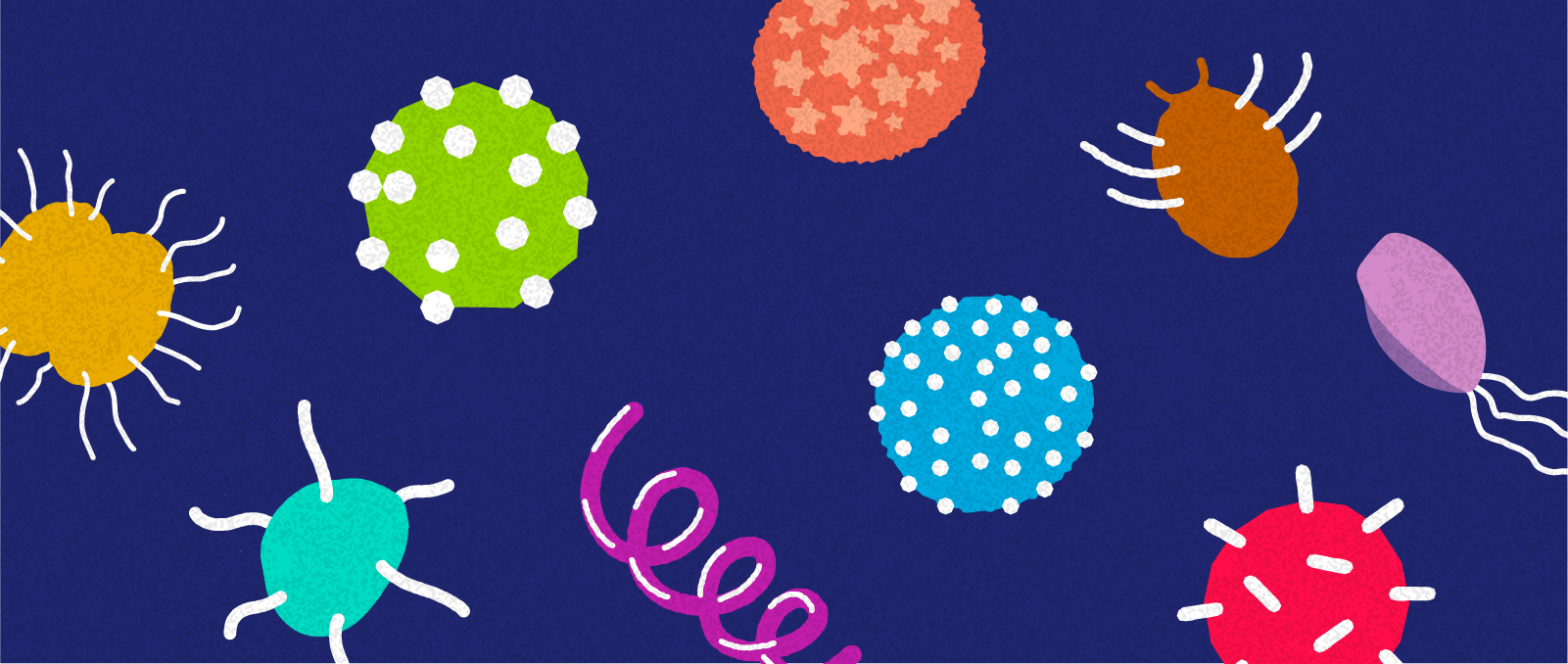
STIs: Genital herpes
Genital herpes is a very common virus that can stay in the body for life, but it usually doesn’t lead to serious health problems. Genital herpes is caused by the Herpes Simplex Virus (HSV). There are two types, HSV-1 and HSV-2 and both can infect the genital and anal area and also the mouth and nose (cold sores). No one should feel ashamed about having herpes and although it can’t be cured, it is worth noting that it is treatable. Herpes is spread through skin-to-skin contact with infected areas, often during vaginal sex, oral sex, anal sex, and kissing. It is passed from one person to another through: unprotected vaginal, anal or oral sex receiving oral sex from someone who has a cold sore or is about to get one your genitals coming into contact with your partner’s genitals skin-to-skin contact during sex if the virus is active on the skin outside the area protected by a condom sharing sex toys without washing them or covering them with a condom with each use a person with whitlows (herpes on the hand) touching a partner’s vagina, genitals or anal area You cannot get herpes from casual contact such as hugging. Symptoms Herpes causes outbreaks of itchy, painful blisters or sores that come and go. It is common for people with herpes to not notice the sores or mistake them for something else, so they might not know they’re infected. Herpes can spread even when you don’t have any sores or symptoms. If you do develop symptoms you may experience: Flu-like symptoms such as fever, headache, aches and pains. Stinging, tingling or itching around the genitals. Small fluid-filled blisters appear anywhere in the genital or anal area, as well as the buttocks or tops of the thighs – these burst leaving small, red sores which can be very painful. Pain when peeing – due to the urine passing over the sores. Unusual vaginal or urethral discharge. Testing Symptoms might not appear for weeks or even years after you're infected with the herpes virus. If you have or start to develop signs or symptoms your healthcare provider will be able to confirm the diagnosis by taking a swab of fluid from the blisters in the affected area. The results can take up to one to two weeks. You might also be tested for other STIs with similar symptoms rule them out and be sure you receive the correct diagnosis and treatment. If you have genital herpes, your previous sexual partners should also get tested. Treatment There’s no cure for herpes, but medication can ease your symptoms and reduce your chances of spreading the virus. Genital herpes will clear by itself, however, seeking treatment early can significantly reduce the time the outbreak lasts and speed up the healing process. It also reduces the risk of you passing it on to someone else. You will be given antivirals which work by preventing the virus from multiplying, however it does not clear the virus from your body completely. Over time, outbreaks usually become less frequent. To ease discomfort in the short term there are a few things you can do: Apply an ice pack or ice cubes in a plastic bag (do not apply ice directly to skin) Take a cool shower to soothe the blisters Apply a local, over-the-counter anaesthetic cream such as lidocaine Wash your hands before and after touching the infected area to avoid introducing bacteria Keep hydrated and drink extra fluids Wear loose, cotton clothing Use an over-the-counter painkiller to help with pain and discomfort Prevention There are several ways to reduce the risk of infection and protect yourself and your partner from genital herpes. You can help prevent the spread of genital herpes by using a condom every time you have vaginal or anal sex and to cover the penis during oral sex and avoid sharing sex toys. However, herpes can still be passed on if the condom does not cover the infected area. You should avoid vaginal, anal or oral sex if you or your partner have blisters or sores, or a tingle or itch indicating an outbreak is coming. When used correctly and consistently, condoms are one of the most effective methods of protection against genital herpes and other STIs (including HIV). Learn more about different types of STIs and their symptoms, treatment, and prevention
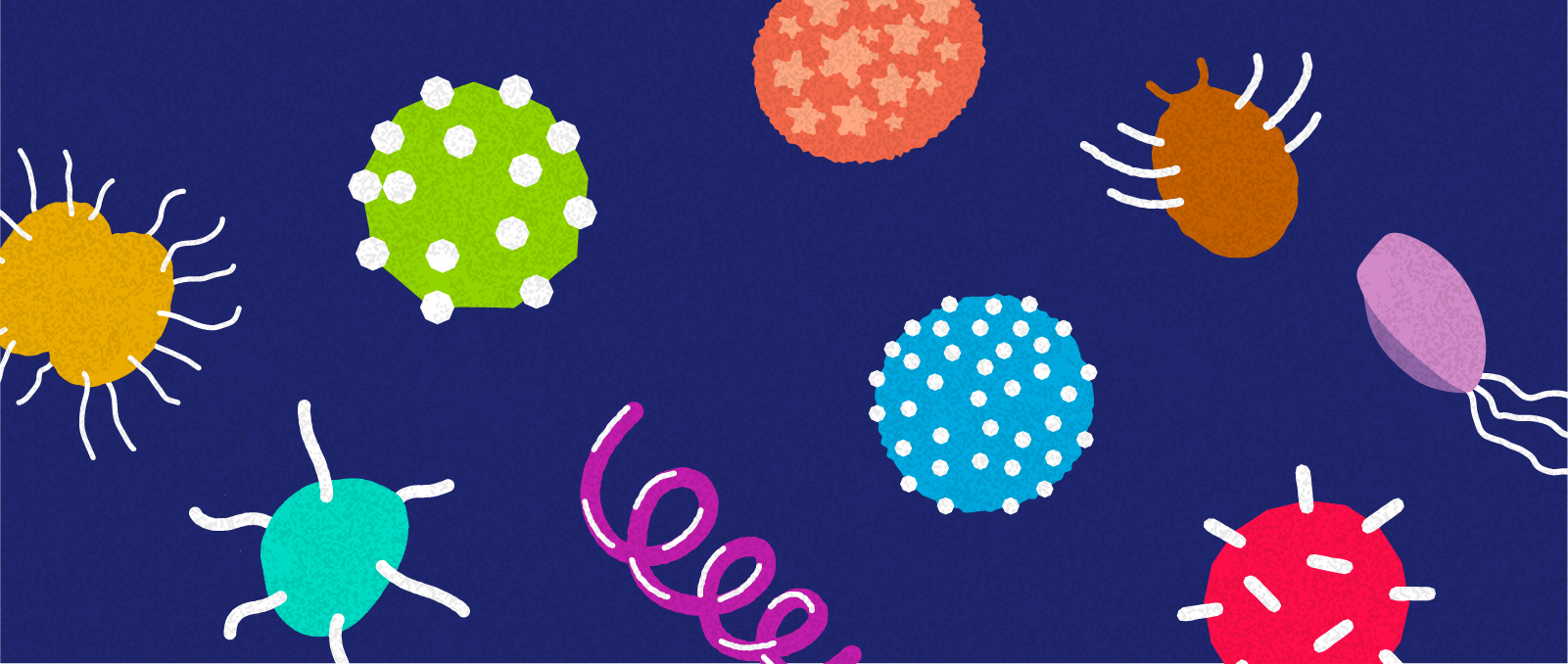
STIs: Gonorrhoea
Gonorrhoea is a common bacterial infection. Anyone who is sexually active can catch gonorrhoea. No one should feel ashamed about contracting gonorrhoea, and it is worth noting that it is treatable. Gonorrhoea is caused by bacteria called Neisseria gonorrhoea that is found in semen and vaginal fluid of people who have the infection. It is passed from one person to another through vaginal, anal, or oral sex without a condom and sharing sex toys without washing them or covering them with a condom with each use. The bacteria can infect the entrance to the womb (cervix), the tube that passes urine out of the body (urethra), the rectum and, sometimes, the throat or eyes. Gonorrhoea can also be passed to babies during childbirth but can be treated during pregnancy with antibiotics. If you're pregnant and may have gonorrhoea, it's important to get tested and treated before your baby is born. You cannot get gonorrhoea through casual contact such as kissing or hugging. Symptoms Some people with gonorrhoea don’t have any obvious signs or symptoms. So even if you don’t have any symptoms, it’s really important you get tested if you’ve had unprotected sex. If you do develop symptoms you may experience: unusual green or yellow discharge from the vagina unusual green, yellow, or white discharge from the tip of the penis a burning feeling when peeing pain or tenderness in the lower abdomen (tummy) heavy periods or bleeding between periods (this is rare) painful swelling of the foreskin pain or tenderness in the testicles (this is rare) If left untreated, gonorrhoea can lead to pelvic inflammatory disease (in women), infertility, and other complications. It is important to get tested and treated as soon as possible if you think you might have gonorrhoea. Testing If you’ve had unprotected sex, have a test as soon as you can. Accurate results should appear after two weeks. Testing for gonorrhoea is done with either a urine test or a swab test: The swab collects a sample from inside the vagina or from the tip of the penis. If you have had oral or anal sex, then a swab may be taken from either your throat or rectum. Taking the swabs may be slightly uncomfortable but should not be painful. Testing from a penis is often from a urine sample instead of a swab, unless you have symptoms. If there is a high chance that you have gonorrhoea (for example if your partner has tested positive), you may be given treatment before the results are back. Treatment Treatment often involves having an antibiotic injection and a course of antibiotic tablets. Most of your symptoms should improve within a few days with effective treatment. It is important to complete the full course of treatment even if symptoms start to clear. If you had symptoms, you should notice improvements quite quickly. You should go back to where you had your test if: the symptoms don’t improve within a week you have unprotected sex again you had unprotected sex with your partner before the treatment was finished you did not follow the instructions or complete the treatment the test was negative, but you develop signs and symptoms of gonorrhoea We recommend you attend a follow-up appointment 1-2 weeks after treatment so another test can be carried out to see if you're clear of infection. You should also avoid having sex until you have been given the all-clear by your healthcare provider. It's important that your current sexual partner and any other recent sexual partners you have had are also tested and treated to help stop the spread of the infection. Prevention There are several ways to reduce the risk of infection and protect yourself and your partners from gonorrhoea and other STIs. It's also a good idea to get tested before each new sexual partner or every three to six months. You can help prevent the spread of gonorrhoea by using a condom every time you have vaginal or anal sex and to cover the penis during oral sex, and by avoiding sharing sex toys. When used correctly and consistently, condoms are one of the most effective methods of protection against gonorrhoea and other STIs. Learn more about different types of STIs and their symptoms, treatment, and prevention
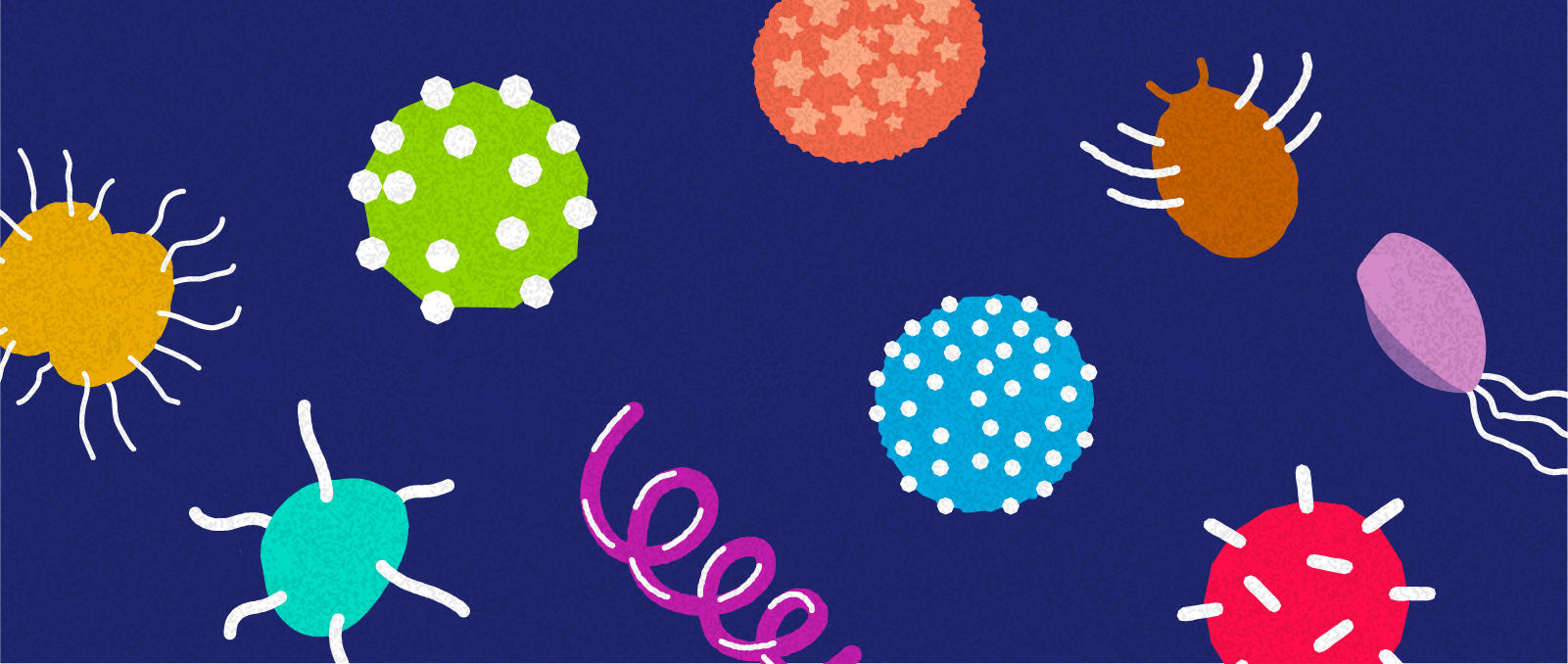
STIs: Chlamydia
Chlamydia is a common bacterial infection, and anyone who is sexually active can catch it. No one should feel ashamed about contracting chlamydia, and it is worth noting that it is easily treatable. Chlamydia is caused by bacteria called chlamydia trachomatis that is found in semen and vaginal fluid of people who have the infection. It is passed from one person to another through vaginal, anal, or oral sex without a condom, your genitals coming into contact with your partner’s genitals, sharing sex toys without washing them or covering them with a condom with each use, and infected semen or vaginal fluid getting into your eye. Chlamydia can also be passed to babies during childbirth but can be treated during pregnancy with antibiotics. You cannot get chlamydia through casual contact such as kissing or hugging. Symptoms Often referred to as a ‘silent’ infection, most people with chlamydia don’t have any obvious signs or symptoms. If you do develop symptoms you may experience: Unusual discharge from the vagina, penis, or rectum Pain when peeing Pelvic and lower abdominal pain Bleeding during or after sex Abdominal pain during vaginal sex Heavy periods or bleeding between periods Painful swelling of testicles Burning and itching in the urethra If left untreated chlamydia can lead to pelvic inflammatory disease in women, infertility, and other complications. It's important to get tested and treated as soon as possible if you think you might have chlamydia. Testing It is also a good idea to get tested before each new partner or every three to six months. If you are concerned after having sex without a condom, seek healthcare advice as soon as you can. However, accurate test results should appear after two weeks. Testing for chlamydia is simple and painless, and it doesn’t necessarily require a physical examination by a healthcare provider. The test is done with either a urine test or a swab test: The swab collects a sample from inside the vagina or from the tip of the penis. A swab may be taken from either your throat or rectum if you’ve had oral or anal sex. Taking the swab may be slightly uncomfortable but should not be painful. Testing from a penis is often from a urine sample instead of a swab, unless you have symptoms. If there is a high chance that you have chlamydia (for example if your partner has tested positive), you may be given treatment before the results are back. Treatment Chlamydia is treated with a course of antibiotics. The two most prescribed treatments are a single dose to take on one day, or a longer course (usually two capsules a day for a week). You should not have sex until you and your current sexual partner have finished treatment. If you had the one-day course of treatment, you should avoid having sex for a week afterwards. You may be given treatment if you have symptoms which suggest that you could potentially have chlamydia, even if you have not received your test results yet. Most antibiotics are safe to use with hormonal contraception (like the Pill, patch, injection or implant), but talk to your healthcare provider prescribing the treatment to make sure. You should tell your healthcare provider if you are pregnant or think you may be, or if you are breastfeeding. This will affect the type of antibiotic you are given. If you had symptoms, you should notice improvements quite quickly. You should go back to where you had your test if: the symptoms don’t improve within a week you have unprotected sex again you had unprotected sex with your partner before the treatment was finished you did not follow the instructions or complete the treatment the test was negative, but you develop signs and symptoms of chlamydia It's important that your current sexual partner and any other recent sexual partners you have had are also tested and treated to help stop the spread of the infection. Prevention There are several ways to reduce the risk of infection and protect yourself and your sexual partners from chlamydia and other STIs. It's also a good idea to get tested before each new sexual partner or every three to six months. You can help prevent the spread of chlamydia by using a condom every time you have vaginal or anal sex and to cover the penis during oral sex, and by avoiding sharing sex toys. When used correctly and consistently, condoms are one of the most effective methods of protection against chlamydia and other STIs (including HIV). Learn more about different types of STIs and their symptoms, treatment, and prevention
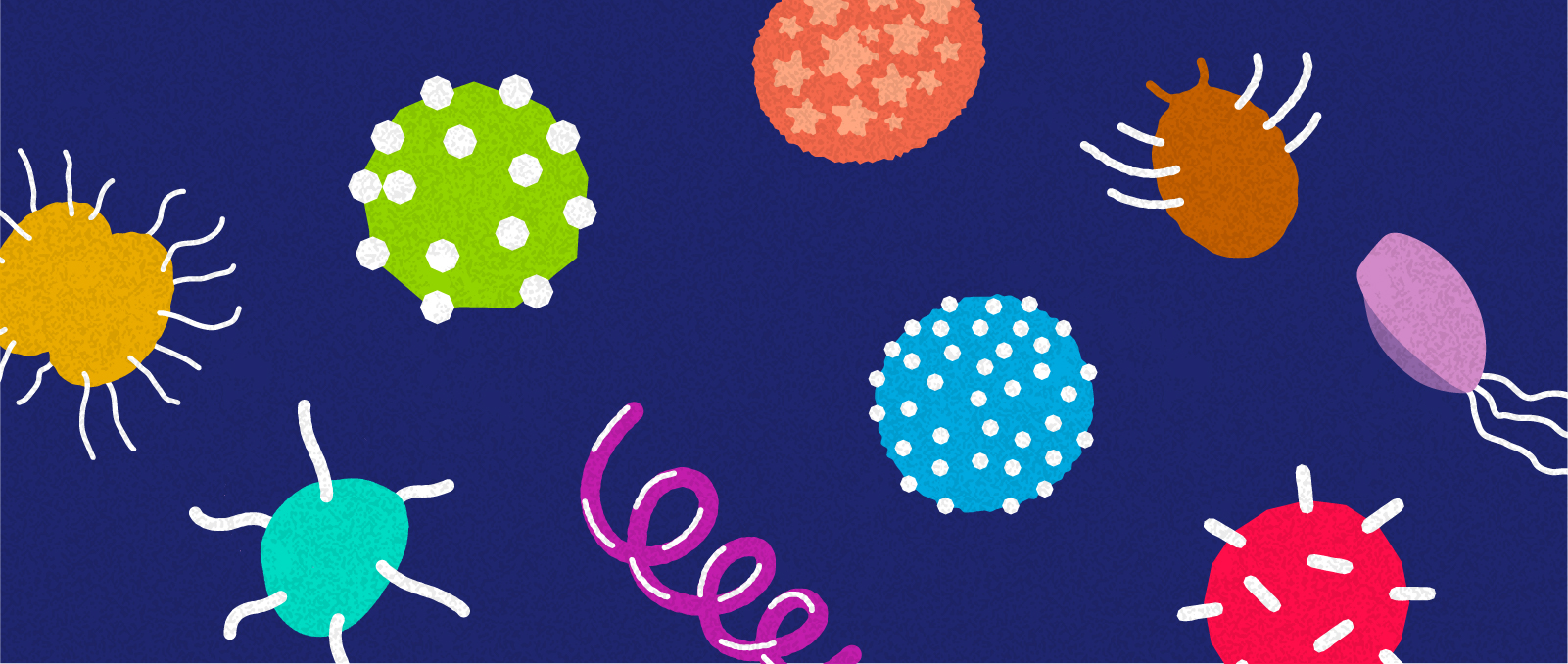
STIs: How to ensure a healthier, safer, and pleasurable sex-life
Knowing how to look after your body can lead to a healthier, safer, and more pleasurable sex life. Taking care of your own sexual health and practicing safer sex can protect you from STIs, including HIV. Sexually-transmitted infections (STIs) A sexually-transmitted infection (STI) is usually a bacterial or viral infection predominantly spread through sexual contact, including vaginal, anal, and oral sex. Some STIs can also be spread via blood or other bodily fluids. Most can be prevented by using condoms. There are over 30 known STIs including these most common ones: Chlamydia Gonorrhea HIV Genital herpes Syphilis Pubic lice Genital warts Hepatitis Trichomoniasis Anyone can get an STI regardless of how many times they have had sex or how many partners they have had. No one should feel ashamed about getting or having an STI and it is worth noting that most are treatable and manageable. In some cases, genital infections aren’t an STI at all. If you’re unsure it’s always important to see your healthcare provider. Common symptoms There are common symptoms associated with STIs, for example: Urethral discharge from the penis could possibly be gonorrhea, chlamydia, trichomoniasis, or mycoplasma genitalium Genital or anorectal ulcers could possibly be syphilis, genital herpes, lymphogranuloma venereum (LGV), chancroid, or donovanosis Abnormal vaginal discharge could possibly be cervical infections of gonorrhea, chlamydia, mycoplasma genitalium or vaginal infections of trichomoniasis, candida, bacterial vaginosis Lower abdominal pain among women could possibly be gonorrhea, chlamydia, mycoplasma genitalium, or anaerobic bacteria Anorectal discharge could possibly be gonorrhea, chlamydia, or lymphogranuloma venereum (LGV) It’s also possible to have an STI without obvious symptoms. It is important to be mindful of signs and to seek professional advice if you think you may be at risk of an STI or develop symptoms. STI testing You should visit a sexual healthcare provider if you or a sexual partner have symptoms of an STI, or you’re concerned about STIs after having sex without a condom. A healthcare provider will ask you questions about your sex life, may ask to examine your genitals or anus, and tell you what tests you might need. Some clinics may offer self-testing or home testing kits. We know it can be hard, but if your test is positive for an STI it is important to inform any recent sexual partners so that they can also get tested and treated if needed. If left untreated, some STIs can carry serious consequences that go beyond the initial infection. For example, STIs such as syphilis and herpes can increase the risk of contracting HIV and gonorrhea, and chlamydia may lead to pelvic inflammatory disease and infertility. Treating STIs Some STIs such as chlamydia, gonorrhea, syphilis, and trichomoniasis can be treated and cured effectively with a course of antibiotics prescribed by your healthcare provider. Like any antibiotics, it is important to complete the full course of treatment, even if symptoms clear. HIV and herpes simplex virus (HSV) are both preventable and treatable, but not curable. Treatment for HIV is a combination of antiretrovirals that can help stop the virus multiplying and by supporting the immune system to have an opportunity to repair itself. Preventing STIs & HIV There are several ways to reduce the risk of infection and protect yourself and your partner from STIs. The vagina, cervix, and uterus can be protected from most STIs by using a condom during sex. When used correctly and consistently, condoms are one of the most effective methods of protection against STIs, HIV, and unintended pregnancies. Vaccines are also available for human papilloma virus (HPV), hepatitis A, and hepatitis B if not already vaccinated when younger. PEP is an anti-HIV medication which can help reduce the risk of HIV after possible exposure. It must be taken within 72 hours of possible exposure and is a 28-day course of medication. It is not guaranteed to prevent HIV and is only recommended in emergency situations after high-risk of exposure. There is also a medicine called PrEP (pre-exposure prophylaxis) for people who do not have HIV. PrEP is taken before sex and can reduce the risk of HIV transmission when it is taken correctly. PrEP can be used as a way to reduce your risk of HIV if you are HIV negative and don’t always use condoms. It is important to remember that PrEP will not protect you from other STIs, and you should wear a condom every time you have sex (whether it is anal, oral or vaginal). You can also talk to your partner about STIs, sexual health, and contraception before engaging in sexual activity. You may want to get tested before having sex – some STIs have no obvious symptoms so it is safer to get tested. STI self-care If you are sexually active it is important to keep yourself safe and healthy, and also protect the health of others. This can be through using protection (condoms) during sex, regular testing (every three to six months), seeking healthcare if you recognize any symptoms, and ensuring you complete the full course of treatment should you test positive for an STI. For those changing partners often, it's a good idea to get tested before each new partner or every three to six months. Being aware of the different types of STIs and how they can be passed on, their symptoms, and how to be tested all help maintain your own, as well as others’, health and wellbeing. Learn more about different types of STIs and their symptoms, treatment, and prevention
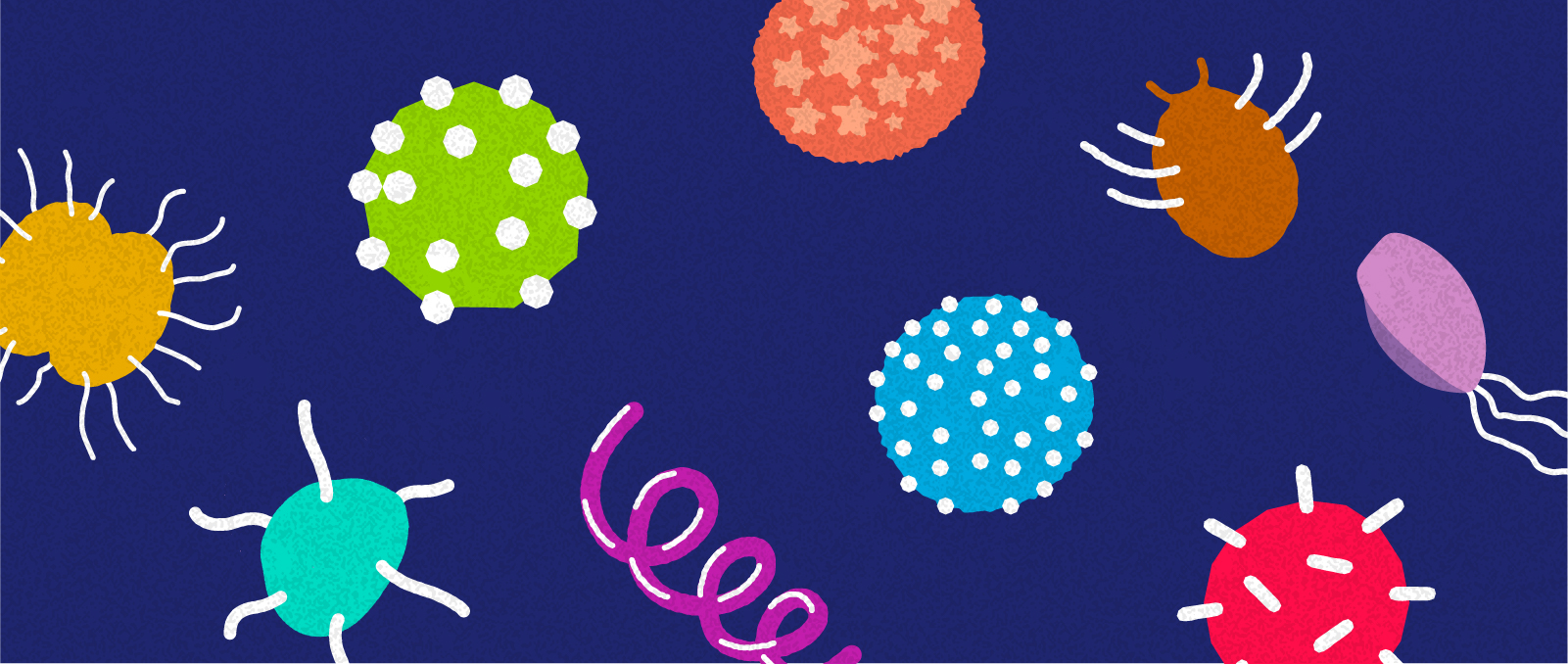
Sexually-transmitted infections (STIs)
Top Impact so far Articles Director-Generals Message Key Messages Donate What are STIs? A sexually-transmitted infection (STI) is usually a bacterial or viral infection predominantly spread through unprotected (i.e. without a condom) sexual contact, including vaginal, anal, and oral sex. Some STIs can also be spread via blood or other bodily fluids. Knowing how to look after your body can lead to a healthier, safer, and more pleasurable sex life. Taking care of your own sexual health and practicing safer sex can protect you from STIs, including HIV. We've created a series of blogs to help you understand some of the more common STIs and their associated symptoms, treatment, and prevention. Learn more... Chlamydia Chlamydia is a common bacterial infection, and anyone who is sexually active can catch it. Chlamydia is caused by bacteria called chlamydia trachomatis that is found in semen and vaginal fluid of people who have the infection. Some of the ways it is passed from one person to another is through vaginal, anal, or oral sex without a condom. Read more Genital herpes Genital herpes is a very common virus that can stay in the body for life, but it usually doesn’t lead to serious health problems. Genital herpes is caused by the Herpes Simplex Virus (HSV). There are two types, HSV-1 and HSV-2 and both can infect the genital and anal area and also the mouth and nose (cold sores). Read more Genital warts Genital warts are caused by the human papillomavirus (HPV) and are small growths or bumps that appear on or around the genital or anal area. There are over 100 different types of HPV which can affect different parts of the body. The most common way for HPV to be passed on is through skin-to-skin contact with someone who has the virus. Read more Gonorrhoea Gonorrhoea is a common bacterial infection. Anyone who is sexually active can catch gonorrhoea. Gonorrhoea is caused by bacteria called Neisseria gonorrhoea that is found in semen and vaginal fluid of people who have the infection. Read more Hepatitis Hepatitis can be caused by drinking alcohol or through viral infections which can be transmitted through sexual activity. There are various types of hepatitis, but only hepatitis A, B, and C can be transmitted through unprotected sexual activity. Read more HIV Human Immunodeficiency Virus (commonly known as HIV) is a virus that damages the body’s immune system so it cannot fight off infections. HIV lives in the blood and some bodily fluids (semen, including pre-cum, and vaginal fluids). Read more Pubic lice Pubic lice are very small, crab-like parasitic insects which live on the pubic hair and survive on human blood. Pubic lice are not necessarily sexually transmitted but are passed on through close bodily contact, including vaginal, anal, or oral sex. Read more Syphilis Syphilis is caused by a bacteria called treponema pallidum and is easily passed from one person to another through unprotected vaginal, anal or oral sex or by sharing sex toys. Read more Trichomoniasis Trichomoniasis is caused by a tiny parasite called trichomonas vaginalis (TV) and infects the vagina and urethra. The infection is passed on through having unprotected (without a condom) vaginal sex or by sharing sex toys. Read more

Changing mindsets through medicine and motivation
“You work with people who have HIV? Why?” That was the question Dr. Gregory Boyce was asked by the young intern that stood before him. He had come to the hospital ward to visit a client who was known to be living with HIV. He approached the intern at the desk and gave his name and designation. The intern looked at him, confused and somewhat amused and asked the question that he has neither forgotten, nor understood to this day. However, this young intern’s question comes from a mindset that Dr. Boyce is working fervently to change. As Deputy Director of the Medical Research Foundation of Trinidad and Tobago (MRF), Dr. Boyce provides clinical and administrative support to a team of doctors and nurses providing care to their clients who are living with HIV. Due to MRF’s long-standing work in HIV research and healthcare, the Family Planning Association of Trinidad and Tobago (FPATT), has referred many clients to Dr. Boyce and his team, and especially clients from the LGBTI+ community. Providing specialist care and support “Persons coming to us from key populations, have very layered needs. They are facing unique challenges in addition to living with the virus. There is still that myth that being HIV positive means that you will positively die. Added to that, there’s the discrimination that the community faces in every aspect of their lives on a daily basis. As a staff, we’ve had to seek special training to guide the way we interact with these clients so that we can meet all their needs appropriately and sensitively,” explains Dr. Boyce. “Apart from medical interventions which are needed to ensure that our clients continue to live healthy lives, we focus heavily on their psychosocial needs. It’s easy to think that because a client is physically healthy that they are also emotionally healthy. We have clients that won’t leave abusive relationships because they think no one else would accept them. We have other clients that are dealing with long-term medication fatigue because they have been taking pills for over 10 years. With that sometimes comes depression and other drug addictions, which is why it’s necessary for us to maintain open and honest relationships to address those accompanying issues.” Making HIV a non-issue Dr Boyce has been committed to providing treatment and care to clients living with HIV for over 20 years. He had worked at the Port of Spain General Hospital after graduating, during which time, medicine for persons living with HIV was expensive and out of reach for many. A few years later, through government programmes, medicine became more affordable, and treatment centres were opening up across the island. However, Dr. Boyce realized that the mortality rate had not changed by much. He wondered why people were still dying from a virus when medicine was easily accessible. “That first conversation – giving a client the news that they’ve tested positive – is very important. We get to show them that HIV is not an impediment. Most times, with the wrong information, they start to draw up a list of things that they can no longer do, like go after a promotion or start a family. Then they go through life shrunken and unrecognizable, not the person they once were. So to answer that intern’s question about why I work with persons living with HIV: I want to make HIV a non-issue,” he states. Dr. Boyce hopes to see HIV disclosure become as acceptable as other chronic illnesses such as cancer or diabetes, where an entire family would work towards caring for the affected person, instead of alienating them. He also hopes to see more inclusion and tolerance towards persons living with HIV, especially those within the LGBTI+ community. “Until a gay or transgender person can walk the streets freely and not be jeered at by passers-by, we still have a long way to go. Until they can access treatment at any public facility without fear or judgment, we have a lot of work to do. It would take a lot of education to change the stigma and discrimination but there is absolutely no reason why another person’s life should be miserable because their expression is different to ours.” He commends the work of FPATT in upholding the sexual and reproductive health and rights of the LGBTI+ community, through ensuring that they have a safe and non-judgmental environment for treatment and care. He says that the Medical Research Foundation values the great relationship that the two organizations have had for years, even as FPATT works towards becoming its own full-service antiretroviral treatment site for persons living with HIV.

Ensuring care for Trinidad and Tobago's LGBTI+ community
Public perceptions, a lack of education, and government policies contribute to the barriers and challenges to achieving equality for all. In a country as diverse as Trinidad and Tobago, this is especially acute for certain key populations, including the LGBTI+ community. For Brandy Rodriguez, Healthcare Navigator at the Family Planning Association of Trinidad and Tobago (FPATT), the struggle is both real and personal. In 1999, Brandy began her transition to womanhood and since 2006 has been working with FPATT in their HIV programme for the LGBTI+ community. “Back in 2004, very little was said about HIV infection, transmission and prevention. In fact, if there was any information, it was misconstrued and meant to stigmatize the LGBTI+ community. I was fairly new to the transgender community, so I made it a mission to research and find out the truths behind HIV and how I could protect myself. I then felt like I had to share what I found with others who were searching as well,” she said. Overcoming prejudice and stigma That’s when FPATT asked Brandy to join their team in educating the LGBTI+ community on the types of healthcare available. Stigma surrounding the community forced many to stay hidden and avoid seeking care. Even if a member of the LGBTI+ community wanted to test for their HIV status, they would never dare to go into a public health centre, because of the fear of being judged by the healthcare professionals. “It’s a simple case of this. When a transgender or non-binary person walks into a health centre or hospital, and the triage nurse has to fill in a form that asks for gender, the only two options there are male and female. So usually, the non-binary person knows that if they want to access that healthcare, free of judgement, they would have to dress as the gender that would bring less attention. At the end of the day, the healthcare provider does not receive accurate information about the client, and the client doesn’t receive the scope of assessment and treatment that may be necessary. So part of what I do, is to simply accompany the client to the appointment so that it’s a less stressful experience and they don’t feel like they are alone,” says Brandy. The importance of access to HIV treatment and care Apart from a great lack of healthcare professionals that are willing to treat the LGBTI+ community non-judgementally, the community also lacks social support. Most of the members of the community face barriers to housing and employment, which often means earning a livelihood through sex work. Over 95% of skilled and employable persons within the LGBTI+ community have turned to sex work because they are constantly denied employment within other industries. “When I began my transition, I was fortunate to have the support of my family; they understood my heart and my need to be my authentic self. Not everyone has that support and so some either migrate or are left homeless because of the fact. Having to work within the sex industry means that they are now at greater risk for HIV or other STIs. My job as an Educator and Navigator is to promote condom use and ensure that they make use of FPATT’s regular HIV testing. If they do test positive, we then have that conversation about U=U, which means that if they [their HIV viral load] are undetectable, they will be untransferable, and then get them to that place of undetectability.” Brandy explains that being undetectable means that the client’s viral load is suppressed, and they are living healthy lives. The team works hard to ensure clients living with HIV enrol in the FPATT Programme, which supports the importance of adhering to consistent treatment, healthy eating, and rest. As well as testing, the Programme offers sexual and reproductive health education on prevention against STIs and both group and one-to-one sessions to anyone who needs it. Advocating for support FPATT has, for many years, advocated for the sexual and reproductive rights of the LGBTI+ community, ensuring that it remains a safe place for HIV testing and counselling. It holds a vision of a world where gender or sexuality are no longer a source of inequality or stigma. FPATT is poised to become a full-service HIV treatment site, offering antiretroviral treatment as well as psychosocial services for persons affected by HIV. FPATT’s goal is to stop discrimination and stigma against persons living with HIV and ultimately end the spread of HIV within Trinidad and Tobago by 2030. October 28, 2021 - We celebrate our much beloved colleague Brandy, LGBTQI+ Healthcare Navigator for FPATT and Trinidadian champion of human rights. She has long been a defender of the rights of LGBTQI+ people, and a pioneer in ensuring access to services while fighting stigma and discrimination in the community. We honor her dedication to equality across the Caribbean, her passionate advocacy for Trans rights. The fight continues in her powerful memory. Conmemoramos a nuestra querida colega Brandy, defensora por la salud LGBTQI+ para FPATT, y referente en Trinidad y Tobago por de los derechos humanos. Ha sido durante mucho tiempo una defensora de los derechos de las personas LGBTQI+, y una pionera en garantizar el acceso a los servicios de salud, al tiempo que luchaba contra el estigma y la discriminación en la comunidad. Honramos su dedicación a la igualdad en todo el Caribe y su apasionada defensa de los derechos de las personas trans. La lucha continúa en su memoria.
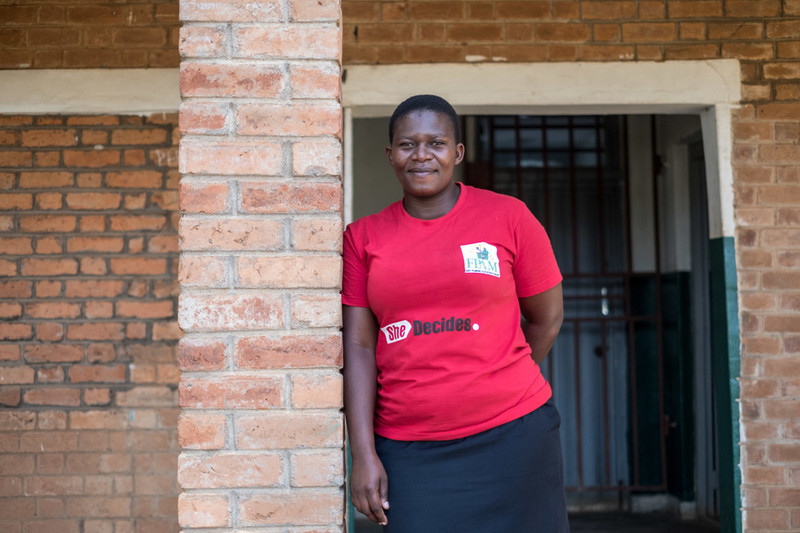
The Global Gag Rule stops care to sex workers
“People think many things of sex workers. They shout at them, speak ill of them, think they are bad people,” says Rachael Banda, a 32-year-old community reproductive health promoter for the Family Planning Association of Malawi (FPAM) in the sleepy northern city of Mzuzu. “But they are not only sex workers, they are many things. Some of them want to do this work, some are there because it’s their business - and with the money they build houses, they pay school fees for their children." Rachael was an outreach worker for Linkages, a project providing sexual and reproductive healthcare to sex workers, which ran in Mzuzu. But in 2017 it was suddenly discontinued following the Global Gag Rule. In 2018, UNAIDS reported that 55% of sex workers in Malawi were estimated to be living with HIV. While condom and ARV use has significantly improved within the community, in 2018 it was also estimated that close to a quarter of HIV-positive sex workers were unaware of their status. Keeping each other safe “I wouldn’t be alive today if it wasn’t for Linkages,” says 30-year-old sex worker *Marianne simply. When outreach workers in Mzuzu met Marianne at a bar, she says she was having unprotected sex and drinking and smoking heavily. “I was just doing everything that I could think of doing,” she explains, but says the project gave her the information she needed to “take care of myself.” Marianne, who is HIV positive, says she was often ill but now feels in a better position to take care of her family. In her eyes, the main benefit of Linkages was that it reached everyone in her community - including those who didn’t feel comfortable going to hospitals for care. Going to hospitals can be difficult for sex workers in Malawi, who are often stigmatized by patients and service providers alike. They can even encounter clients at hospitals, which can mean “clients can end their relationships with us because they know we are testing for STIs,” says Memory, a 32-year-old sex worker in Lilongwe. Because public hospitals are oversubscribed, patients need to arrive early to queue - but this is often not possible for sex workers who have been up through the night, explains Marianne. In Mzuzu, she says the situation improved when Linkages trained hospital staff to treat sex workers respectfully and provided the women with “slips which meant we would be seen quickly and could return to our work,” she says. Bringing care directly to clients “Sex workers are very busy people,” explains Rachael, who travelled to ‘hotspot’ bars in Mzuzu around-the-clock to provide sex workers with contraception and STI testing and treatment. “If we go to them, they can leave a client in their room, receive services from us and then go back to their room and make their business,” she says, adding that it was her responsibility to follow up with the sex workers afterwards to make sure their treatment was working. “I can say I know every bar in this town now!” Rachael laughs. “We treat everyone equally, out in the community and here in the centre,” says Rachael, speaking at the FPAM Youth Life Centre in Mzuzu. Through the Linkages initiative, sex workers were also trained and hired in two other drop-in centres as receptionists, cleaners, and outreach workers. Though FPAM is no longer running those centres, the women are still working there. In Mzuzu and Lilongwe, Malawi’s capital, Linkages trained sex workers as peer educators in sexual and reproductive healthcare and information, which women in both cities say has had a lasting impact. Cecilia, a 36-year-old sex worker and peer educator from Lilongwe, says that going through an HIV test herself gave her the confidence to encourage her friends to do the same. “That can only happen when you’re from the same community and are facing the same issues,” she explained. Her friend Mary, also a Lilongwe-based sex worker, agrees that Linkages brought their community together, particularly when deciding as a group what action to take when someone has been sexually assaulted. Marianne says that she now takes pride in keeping herself and her community safe. “With the new information I got, I was protecting my friends by using a condom when a man comes, so that when another woman sleeps with the same man she won’t get the same infection.” *Pseudonym

IPPF statement on revised WHO contraception guidance
Since the early 1990s, evidence had been inconclusive as to whether using hormonal contraception increased women’s risk of acquiring HIV. This was a critical issue, particularly for areas with high HIV prevalence, such as sub-Saharan Africa. To address this, the ECHO trial, a randomised clinical trial, was designed to compare three highly effective, reversible methods of contraception – a progestogen-only intramuscular injectable, depot medroxyprogesterone acetate (DMPA-IM); a progestogen implant (Jadelle®); and the non-hormonal copper intrauterine device (IUD). The results – that the ECHO trial did not find a statistically significant difference in HIV risk between the contraceptive methods it evaluated – were published in The Lancet on 13 June 2019. IPPF International Medical Advisory Panel (IMAP) issued a statement and a technical brief was developed to discuss the results and highlight key recommendations to local IPPF affiliates and other organizations in the field. Following on the release of the results of the ECHO trial, the World Health Organization (WHO) released an updated guidance statement on contraceptive eligibility for women at high risk of HIV on 29 August 2019. WHO now recommends that women at high risk of HIV can use all methods of contraception without restriction (Medical Eligibility Criteria (MEC) Category 1), including progestogen-only contraceptives such as DMPA-IM and DMPA-SC. This is a change from WHO’s March 2017 guidance which classified progestogen-only injectables as MEC Category 2 for women at high risk of HIV acquisition, which states “the benefits of a method outweigh the theoretical or proven risks.” The change is in response to the new epidemiological and biological evidence, as well as related information. The ECHO trial results and WHO’s updated guidance underscores the continued need to expand and ensure equitable access to a broad mix of contraceptive methods. WHO also emphasizes the importance of HIV/STIs testing and prevention services, including the integration of family planning and HIV/STIs services as appropriate, along with other SRH services. IPPF welcomes the efforts of WHO in providing evidence-based guidance and recommendations to organizations providing sexual and reproductive health services. IPPF will continue supporting the right of women and girls to have access to broader contraceptive options, ensuring a woman’s risk of HIV does not restrict her contraceptive choice. IPPF reaffirms the importance of providing rights-based information and services to support all people in realizing their reproductive choices as part of an integrated package of interventions including HIV/STIs prevention. The results from the recent ECHO trial remind us of the risks of vertical programmes and the need to accelerate efforts in HIV/STIs prevention and treatment as an integral part of SRH services.
IMAP statement on the ECHO trial
The body of evidence on possible increased risk of HIV acquisition with use of progestogen‑only contraception has remained mixed since 1991, with the greatest concern of an increased risk of HIV acquisition centred on the use of intramuscular depot‑medroxyprogesterone acetate (DMPA‑IM). Data on the risk of HIV acquisition and use of other highly effective contraceptives such as norethisterone enanthate (NET‑EN), hormonal implants, and hormonal and non‑hormonal IUDs are limited.2 And there are no data on subcutaneous DMPA (DMPA‑SC) and HIV risk. In 2016, an updated systematic review of epidemiological evidence on hormonal contraception and HIV acquisition concluded that there was a significant association between the use of DMPA and HIV acquisition and no increased HIV risk with oral contraceptive pills.3 The updated systematic review provided important data regarding DMPA users at high risk of HIV; however, confounding in these observational data could not be excluded. The historically mixed data and the need to control for confounding required further investigation into the association between use of progestogen‑only injectables and increased risk of HIV acquisition, using a more robust research design. This led to the development of the Evidence for Contraceptive Options and HIV Outcomes (ECHO) trial.
Pagination
- Previous page
- Page 3
- Next page







